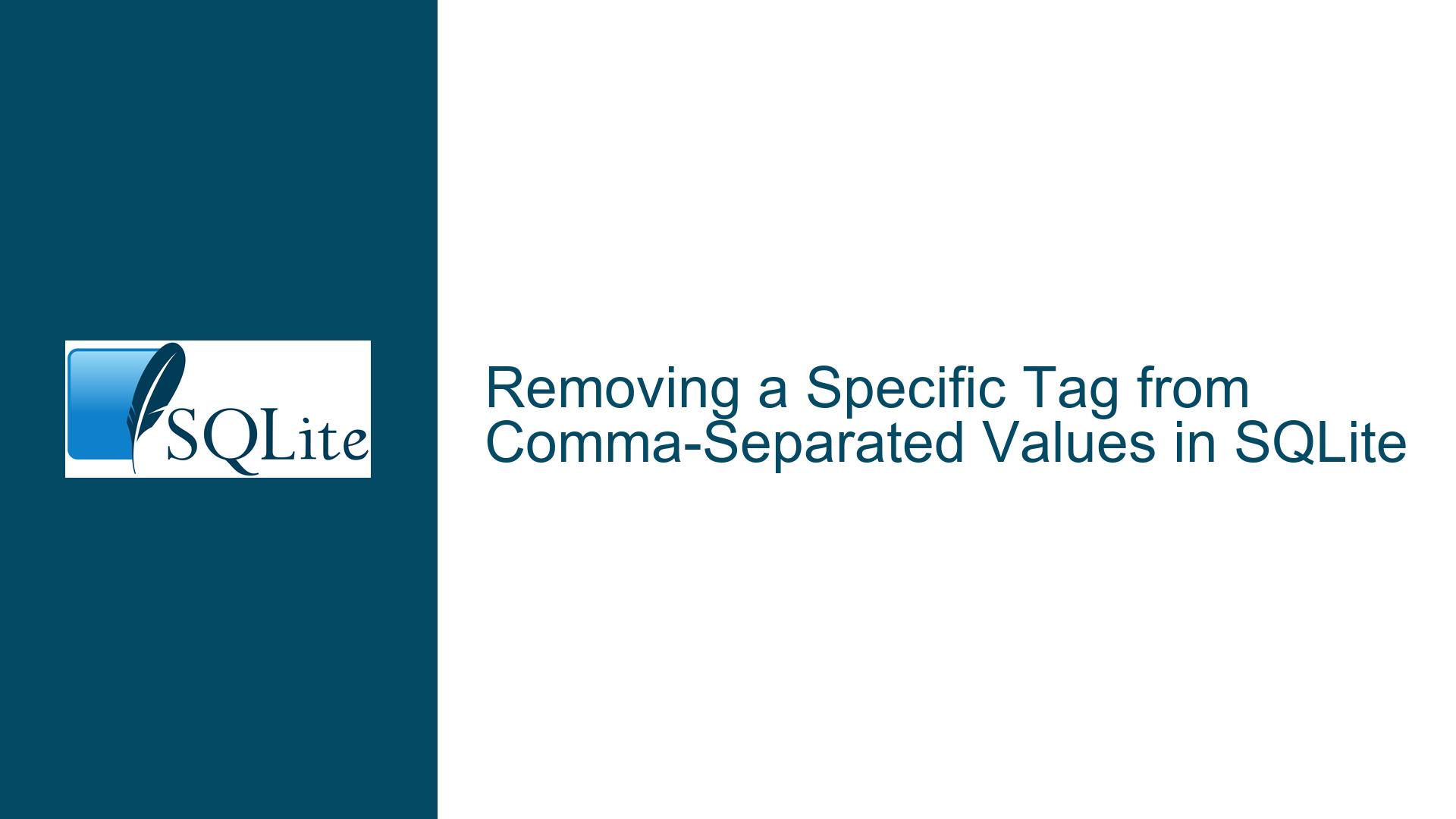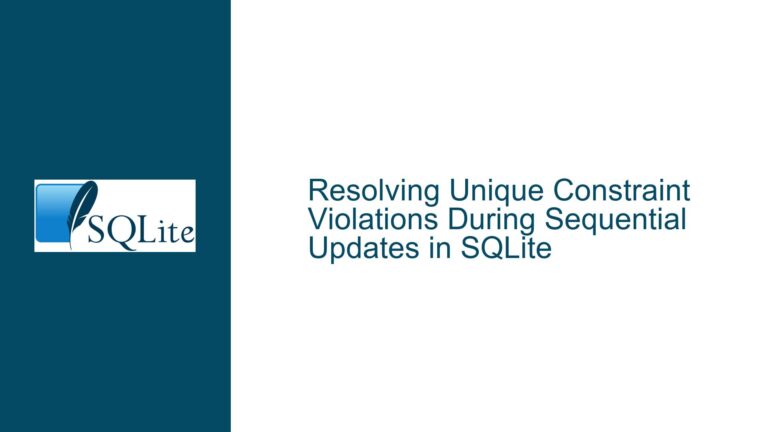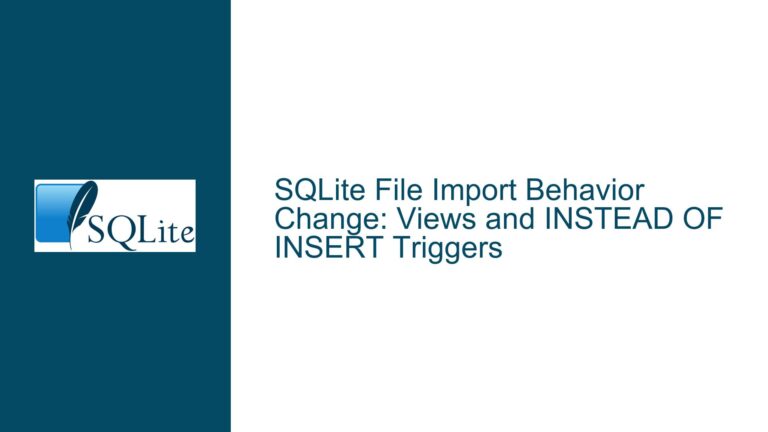Removing a Specific Tag from Comma-Separated Values in SQLite
Challenges with Substring Replacement in Comma-Delimited Tag Columns
Issue Overview: Tag Deletion in Comma-Separated Strings
The problem revolves around modifying a column (tags) in a SQLite table (assets) that stores comma-separated strings (e.g., dog,retriever,funny). The goal is to delete a specific substring (a tag) from all rows when that tag is removed globally. For example, if the tag retriever is deleted, the string dog,retriever,funny should become dog,funny.
The initial attempts used SQLite’s REPLACE() and TRIM() functions but failed to account for edge cases such as:
- Tags at the beginning or end of the string (no leading/trailing commas).
- Overlapping substrings (e.g., removing
catfromhousecat,catapult). - Residual commas after deletion (e.g., converting
dog,,cattodog,cat). - Whitespace inconsistencies (e.g.,
catvs.cat).
The core challenge is ensuring precise substring matching while maintaining the integrity of the comma-separated format.
Root Causes of Failed Tag Removal
Incorrect Delimiter Handling
- Tags at the start or end lack bounding commas (e.g.,
catorcat,dog). Directly replacing,catorcat,risks missing standalone tags or leaving residual commas. - Example: Replacing
,retrieverindog,retriever,funnyworks, but replacingretrieverinretriever,dogleaves,dog.
- Tags at the start or end lack bounding commas (e.g.,
Substring Collisions
- Partial matches (e.g.,
catincatapult) are unintentionally altered. SimpleREPLACE(tags, 'cat', '')would corrupt valid tags.
- Partial matches (e.g.,
Whitespace Sensitivity
- Tags with leading/trailing spaces (e.g.,
cat) won’t match a replacement targetingcat.
- Tags with leading/trailing spaces (e.g.,
Residual Commas
- After deletion, consecutive commas (e.g.,
dog,,funny) or leading/trailing commas (e.g.,,dog,funny) may remain if not trimmed properly.
- After deletion, consecutive commas (e.g.,
Query Parameterization Issues
- Using Python’s f-strings (e.g.,
f',{tag_text},') instead of bound parameters can introduce syntax errors or SQL injection vulnerabilities.
- Using Python’s f-strings (e.g.,
Step-by-Step Solutions for Robust Tag Deletion
1. Normalize the Tags Column
Wrap the tags column with commas to ensure every tag is bounded. This avoids edge cases with the first or last tag:
UPDATE assets
SET tags = TRIM(
REPLACE(',' || tags || ',', ',', ',,')
);
This converts dog,retriever,funny to ,,dog,,retriever,,funny,,, simplifying pattern matching.
2. Precise Tag Replacement
Use a parameterized query to replace the target tag (bounded by commas) with a single comma:
tag = "retriever"
cursor.execute(
"""
UPDATE assets
SET tags = TRIM(
REPLACE(',' || tags || ',', ',?,', ','),
','
)
""",
(tag,)
)
This ensures retriever is removed from ,,dog,,retriever,,funny,,, resulting in ,,dog,,funny,,.
3. Clean Up Residual Commas
After replacement, collapse consecutive commas and trim leading/trailing delimiters:
UPDATE assets
SET tags = TRIM(
REPLACE(REPLACE(tags, ',,', ',,'), ',,', ','),
','
);
This converts ,,dog,,funny,, to dog,funny.
4. Handle Whitespace Variations
Normalize whitespace before replacement:
UPDATE assets
SET tags = TRIM(
REPLACE(REPLACE(',' || tags || ',', ' ', ''), ',?,', ','),
','
);
5. Validate with Test Cases
Test scenarios to confirm correctness:
- Case 1:
cat→ Removescatfromcat,dog→dog. - Case 2:
cat→ Removescatfromhousecat,cat→housecat. - Case 3:
cat→ Removescatfrom, cat ,→ Empty string.
6. Alternative: Recursive SQLite CTE
For complex scenarios, split tags into rows, filter, and reassemble:
WITH split_tags AS (
SELECT
rowid,
GROUP_CONCAT(
CASE WHEN value <> ? THEN value END,
','
) AS new_tags
FROM assets, json_each('["' || REPLACE(tags, ',', '","') || '"]')
GROUP BY rowid
)
UPDATE assets
SET tags = (SELECT new_tags FROM split_tags WHERE split_tags.rowid = assets.rowid);
7. Python-Specific Implementation
Using sqlite3 in Python:
def delete_tag(tag: str):
conn = sqlite3.connect("database.db")
cursor = conn.cursor()
cursor.execute(
"""
UPDATE assets
SET tags = TRIM(
REPLACE(
REPLACE(',' || tags || ',', ',', ',,', ',?,', ','),
',,',
','
),
','
)
""",
(tag,)
)
conn.commit()
conn.close()
8. Performance Considerations
- Indexing: Add a virtual column for frequent tag searches:
CREATE VIRTUAL TABLE assets_tags USING fts5(tags); - Batch Updates: Use transactions for bulk operations.
By addressing delimiter boundaries, whitespace, and substring collisions, this approach ensures reliable tag deletion without schema changes.






